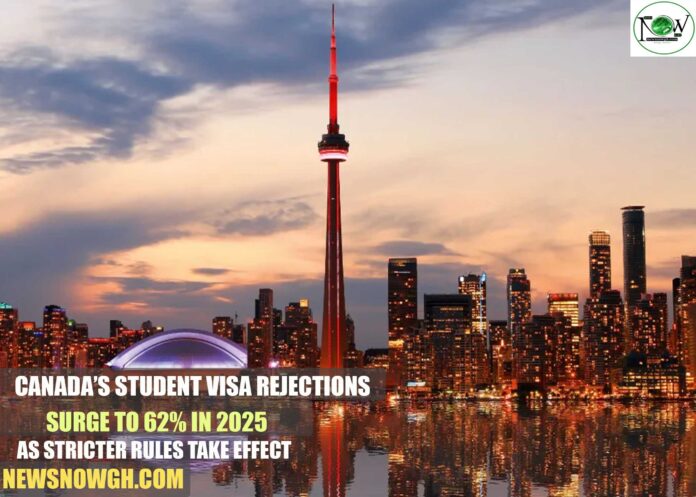Canada’s Student Visa Rejections Surge to 62% in 2025 as Stricter Rules Take Effect
In 2025, Canada’s student visa rejection rate hit 62%, the highest in a decade. Stricter financial requirements and work permit conditions prompt students and universities to reevaluate their futures. This shift represents a significant change in Canada’s approach to international education.
Canada has long attracted international students, but new statistics reveal an increasingly stringent process. Recent data from Immigration, Refugees and Citizenship Canada (IRCC) shows that 62% of student visa applications were denied in 2025. This marks a rise from 52% in 2024 and an average of around 40% in previous years.
For many applicants, this isn’t just a bureaucratic hurdle; it signifies a fundamental change in Canada’s educational landscape.
Rejection Rates at Their Highest in a Decade
This rejection rate is the worst in ten years, with Indian students facing the brunt of the impact. Reports indicate that up to 80% of applications from Indian students were rejected. While Canada hasn’t provided a detailed country breakdown, applicants from Asia and Africa are also struggling.
In 2024, Canada welcomed over one million international students, making it the second-largest destination globally, after the United States. Nearly half of these students came from India, with others from China and Vietnam. However, this favorable scenario is rapidly shifting.
Why Canada is Rejecting More Applications
The surge in visa rejections is attributed to domestic challenges. Issues like housing shortages, high living expenses, and concerns about students’ financial stability have compelled the government to tighten application rules. Key changes include:
- Higher Financial Proof: Minimum required funds doubled to CA20,635 (about US14,963) as of December 2024.
- Stricter Paperwork Checks: Applications must be error-free and include detailed study plans.
- Closer Scrutiny: Immigration officers are now reviewing applications more rigorously than before.
Fewer Study Permits and New Rules
In 2025, Canada aims to issue 437,000 study permits, a reduction of about 10% from the previous year. This total includes 73,000 for postgraduate students, 243,000 for undergraduates and other programs, and 120,000 for school-age children and renewals. Recent changes also tightened post-graduation work permit rules:
- University graduates must now prove English or French proficiency at the B2 level or higher.
- College graduates require a minimum B1 level.
- Students in unapproved programs are no longer eligible for post-study work permits.
- The Student Direct Stream, which expedited visas for students from 14 countries, has been eliminated.
The Numbers Behind the Change
The cap on international students, introduced in 2024, has become even more restrictive. Last year, Canada issued only 267,890 new study permits, nearly 100,000 fewer than targeted and about half of what was granted in 2023. As of June 2025, Canada still has a substantial international student population:
- 546,562 people hold study permits only
- 312,010 hold both work and study permits
However, the overall trend indicates a clear government intent to reduce numbers.
What This Means for Students and Universities
The new landscape presents significant challenges for students. Families invest considerable time and resources preparing applications, only to face denials. Many are now exploring options in countries like Australia, the UK, or Germany.
Canadian universities also feel the impact. International tuition fees have been a crucial revenue source, and with fewer approvals, institutions face uncertainty about enrollments. They may need to make tough decisions regarding programs and staffing.
Conclusion
The rise in student visa rejections in Canada highlights a critical transformation in the country’s approach to international education. Students and universities must adapt to this new reality to navigate the evolving landscape effectively.
Follow NewsNowGh to stay updated on the latest information regarding work permits, visas, and visa-sponsored employment.


